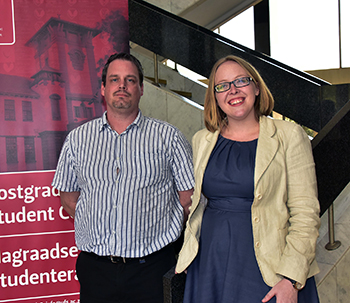Latest News Archive
Please select Category, Year, and then Month to display items
08 August 2023
|
Story EDZANI NEPHALELA
|
Photo EDZANI NEPHALELA
 Mbulelo Aven Jafta, Xhariep Municipality Corporate Services Director, and Dr Engela van Staden, Deputy Vice-Chancellor: Academic at the UFS, sign a memorandum of understanding to enrich various communities in the Xhariep Municipality areas through leadership training.
Mbulelo Aven Jafta, Xhariep Municipality Corporate Services Director, and Dr Engela van Staden, Deputy Vice-Chancellor: Academic at the UFS, sign a memorandum of understanding to enrich various communities in the Xhariep Municipality areas through leadership training.
The University of the Free State (UFS) has signed a memorandum of understanding with the South African Local Government Association (SALGA) and the Xhariep Municipality that is aimed at positively impacting communities through strategic partnerships. The organisations plan for their collaboration to make a significant difference by training 35 of their employees via the UFS Business School – 15 will undertake the Foundation Skills Short Learning Programme, and 20 the Bachelor’s degree in Management Leadership.
This joint effort will equip these employees with essential skills and knowledge and empower them to carry out their responsibilities efficiently and effectively. Rooted in the UFS’s Vision 130, this initiative fosters positive change within the community by enhancing social justice and innovation.
Dr Engela van Staden, Deputy Vice-Chancellor: Academic at the UFS, emphasised the university's dedication to human resource development and empowering individuals. “We were very excited when we got this engagement with you, and I hope it will be fruitful for you, because that’s the intention. We are also reaching out to other municipalities because we are doing it for our country, and the sooner we do it, the better the services you will deliver to people.”
Xhariep Municipality expressed gratitude for the collaboration, recognising its significance in empowering its employees. Mbulelo Aven Jafta, Corporate Services Director at the municipality, thanked the university for accepting the partnership. “As a municipality, we are interested in capacitating our employees to perform their duties optimally. It is through these partnerships that we reach our intended targets. This is the first two projects, and many more will be coming as our partnership progresses, and we intend to use this opportunity to the best of our abilities.”
Jafta said that such partnerships encourage a more interconnected and interdependent world. “As organisations work towards common goals, they create a ripple effect that can lead to a brighter and more promising future and play a vital role in shaping a positive and sustainable future.”
National 3MT competition held at UFS
2017-03-29

The two winners of the Three minute thesis
competition, Andrew Verrijdt (left) and
Kerryn Warren (right).
Photo: Charl Devenish
From Neanderthal hybrid children to eating corn silk as a way of managing kidney diseases, the National Three Minute Thesis competition (3MT) captivated the mind.
“We brought the competition to South Africa and hosted the local, regional, and national competitions for the past few years,” said Dr Emmie Smit, organiser of the event. It is an opportunity to raise the profile of postgraduate research and to develop a cross-disciplinary student community to effectively communicate research to a wide audience. The event was founded by the University of Queensland, Australia. The third national 3MT competition took place at the University of the Free State (UFS) on Friday 24 March 2017.
Three minutes and one slide
During the competition, participants had three minutes to explain their master’s or doctoral research and one static PowerPoint slide could be used. “It is very important that this slide works for you. There must be some way the information on the slide connects to what you present,” said Dr Henriette van den Berg, Director of the Postgraduate School at the UFS.
Winners grateful for opportunity
“It is an honour and a drive. It is very nice to have this sort of thumbs up,” said Kerryn Warren, winner of the Science category. Her research title was, What did a Human-Neanderthal Child Look Like? “I have been looking at the hybrids between different species and subspecies of mice in order to use them as a model to find out what human hybrids looked like.”
The presentation by Andrew Verrijdt, winner of the Humanities category, entitled Hiding in the Deep: Anonymous Websites for Paedophiles on the ‘Darknet’, gave a glimpse into the mysterious and dangerous realm of the dark web. “I am grateful for the opportunity. Primarily because I think it’s an important topic, and society will benefit by getting the word out there as it is a sensitive topic,” he said. The two winners, both from the University of the Cape Town, won R15 000 each. A further R30 000 of prize money went to the four runners-up.